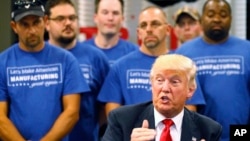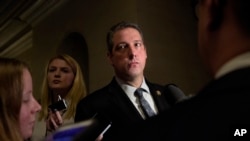With the inauguration of Republican Donald Trump as the 45th U.S. president weeks away, Democrats are facing a winter of discontent and many questions as they contemplate the future.
The party is looking to recover following Trump's election victory last month, a result that surprised and even shocked some Democrats who were musing about Hillary Clinton's Cabinet picks and the potential for several Supreme Court appointments. Democrats also face Republican control of the Senate and the House of Representatives for at least two years.
Trump in campaign mode
The Democrats' dilemma was seen last week as Trump began a victory tour with a rally in Cincinnati, Ohio, fresh off a visit to a factory in Indiana where he helped negotiate a deal to keep 1,000 jobs from going to Mexico, following through on a campaign pledge.
Trump thanked voters in Ohio, one of several states in the industrial Midwest that helped give him his margin of victory in the Electoral College.
"In a true sense, history called and the people of this great state [Ohio] answered and you are going to be very happy," Trump told cheering supporters. "We are going to say right now, what are we going to do? We are going to make America great again. You watch!" Trump told supporters at a rally in Cincinnati.
Democrats’ challenge in Congress
Facing renewed Republican control of Congress, Democrats must now consider what kind of opposition they want to be during the Trump administration.
"Where does the party go?” asked analyst John Fortier of the Bipartisan Policy Center in Washington. “Is it a party that really looks to some of its more progressive figures like [Massachusetts Senator] Elizabeth Warren and others like [Vermont Senator] Bernie Sanders, who would lead the party in a more left direction, or would they go in a direction more like you saw from Hillary Clinton, which is more in the middle of their party?"
Sanders is urging Democrats to reassess the party's dwindling appeal to working-class voters, who overwhelmingly supported Trump. "There are millions of people today, working-class people, middle-class people, low-income people, who are living in despair," Sanders told Democrats at a recent rally.
Once Trump is inaugurated, Democrats expect Republican initiatives to undo President Barack Obama's signature domestic achievement, the Affordable Care Act, known as Obamacare, and a sweeping tax cut plan. New Senate Democratic leader Chuck Schumer of New York has said his party is ready to oppose Trump where necessary, but may be open to cooperation on some issues such as infrastructure spending, popular with Democrats as a catalyst for jobs.
Some Democrats rigidly oppose Trump. Illinois Democratic Representative Luis Gutierrez says he will not attend Trump's inauguration next month because, "He [Trump] continues to spew hatred, bigotry and prejudice even after he said he was going to bring us all together."
Trump repeated his pledge to work toward unity at his Ohio rally. "We are not going to be divided for long. I have always brought people together. I know you find that hard to believe."
Democrats must also brace for a mid-term election in two years when many more Democratic senators are up for re-election than Republicans, many in states Trump carried in November.
Working-class voters
Ohio Congressman Tim Ryan, who lost a bid to replace California Congresswoman Nancy Pelosi as House Democratic leader, is also concerned about how to broaden his party's appeal. "I believe it in my heart that if we are going to win as Democrats, we need to have an economic message that resonates in every corner of this country," Ryan said after losing his challenge to Pelosi.
Ryan drew the support of nearly a third of House Democrats, and Pelosi ally New York Congressman Joseph Crowley said, "Democrats are the party with ideas and a vision, but we need to do a better job of connecting with people on the ground who made it clear they weren't listening or couldn't hear what we had to say."
The party's future could also be a focus for Obama once he leaves the White House, since after Clinton's defeat, Democrats appear to lack a national leader.
Obama recently said that, no matter what, Democrats need to retain their fundamental commitment to ensuring economic fairness. "So there are going to be a core set of values that shouldn't be up for debate and should be our North Star [unifying principle]," Obama said. "But how we organize politically, I think, is something that we should spend some time thinking about."
‘Blue Wall’
Even though Clinton won the popular vote by more than 2 million ballots, she lost the electoral vote because Trump was able to penetrate the vaunted Democratic "blue wall" of upper Midwestern states including Michigan, Wisconsin and Pennsylvania — states that had voted for a Democrat in every presidential election since 1992.
Many white working-class voters in those states shifted to Trump this year, said conservative commentator Fred Barnes on VOA's "Issues in the News" program.
"And he did something that I thought Republicans were going to maybe never be able to do, and that is win Pennsylvania, win Ohio, win Michigan and win Wisconsin, the Rust Belt, the industrial belt, where there are so many working-class people, a number of them out of work, but still an awful lot of them," said Barnes, who is editor of a conservative magazine, The Weekly Standard.
Trump had success with voters who felt abandoned by the Democratic Party.
Rebecca Thoeni of Dubuque, Iowa, was a longtime Democratic voter drawn to Trump. Thoeni told the Associated Press, "Trump got out there and showed he was serious about keeping jobs. He explained things in layman's terms. That's what changed me."
It was a common theme in several states of the upper Midwest.
A new Democratic majority
Meanwhile, Clinton slightly under-performed with minority and millennial voters who were the backbone for two Obama presidential victories.
Given the continuing growth in the non-white population, forecast for the years ahead, Democrats remain reasonably well positioned for the future, said John Fortier.
"They actually did get more popular votes than Donald Trump will get,” he said, “and the argument that some of those groups are growing and that the demographic future is good for Democrats, I think, is something that they will look to as a positive."
In the months ahead, congressional Democrats will have to decide where they will oppose Trump, and where there is common ground.
Senator Ben Cardin of Maryland told VOA that Democrats are likely to draw a line when it comes to issues like the economy, civil rights and immigration.
"Who stands up for the basic values of America, protecting the diversity of our country?” Cardin said in a recent interview. “We are proud of so many people from other countries who have come to America to help build a stronger America; we need to speak out about those values, and if the Democratic Party can get that message across, I think we can be more successful in future elections.”











